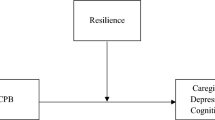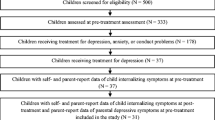Abstract
Objectives
Depressive symptoms in parents are associated with increased risk for behavioral and emotional problems (BEP) in preschool-aged children. It is unclear if particular symptoms of child BEP are associated with parental depression. This study describes the prevalence of (1) self-reported depressive symptoms in parents and (2) BEP in children ages 3–5 years, both measured during pediatric well-visits. It also examines the relationship between parental depressive symptoms and BEP in preschool-aged children in primary care.
Methods
Caregivers (n = 2645) accompanying children ages 3–5 years old for well-visits completed the Early Childhood Screening Assessment (ECSA), a tool which assesses for child BEP and parental depressive symptoms. Spearman’s rho was used to examine correlations. Logistic regression was used to predict the dichotomous outcome of depressive symptoms among caregivers based on ECSA item responses covarying for caregiver type and child age, gender and race.
Results
Screening indicated that 3.1% (n = 82) of caregivers reported parental depressive symptoms and 12.5% (n = 331) of children had a positive screen for BEP. One out of 2 children (56.1%) of caregivers with depressive symptoms had positive BEP screens compared to approximately 1 in 10 (11.1%) children of caregivers without depressive symptoms (p < 0.0001).
Conclusions
There was a significant relationship between caregiver depressive symptoms and child BEP symptoms, highlighting the importance of screening for both constructs. Early identification and treatment of both parental depressive symptoms and child BEP allows for appropriate referral and treatment that may mitigate adverse outcomes and promote optimal child development.
Similar content being viewed by others
References
American Academy of Pediatrics Committee on Psychosocial Aspects of Child and Family Health and Task Force on Mental Health. (2009). The future of pediatrics: mental health competencies for pediatric primary care. Pediatrics, 124, 410–421.
Arroll, B., Goodyear-Smith, F., Crengle, S., Gunn, J., Kerse, N., Fishman, T., & Hatcher, S. (2010). Validation of PHQ-2 and PHQ-9 to screen for major depression in the primary care population. Annals of Family Medicine, 8, 348–353.
Briggs-Gowan, M. J., & Carter, A. S. (2008). Social-emotional screening status in early childhood predicts early elementary school outcomes. Pediatrics, 121, 957–962.
Bufferd, S. J., Dougherty, L. R., Carlson, G. A., Rose, S., & Klein, D. N. (2012). Psychiatric disorders in preschoolers: continuity from ages 3–6. American Journal of Psychiatry, 169, 1157–1164.
Davé, S., Sherr, L., Senior, R., & Nazareth, I. (2008). Associations between paternal depression and behavior problems in children of 4–6 years. European Child and Adolescent Psychiatry, 17(5), 306–315.
Davé, S., Petersen, I., Sherr, L., & Nazareth, I. (2010). Incidence of maternal and paternal depression in primary care: a cohort study using a primary care database. Archives of Pediatric Adolescent Medicine, 164(11), 1038–1044.
Dubowitz, H., Feigelman, S., Lane, W., Prescott, L., Blackman, K., Grube, L., & Tracy, J. K. (2007). Screening for depression in an urban pediatric primary care clinic. Pediatrics, 119(3), 435–443.
Egger, H. L., & Angold, A. (2006). Common emotional and behavioral disorders in preschool children: presentation, nosology, and epidemiology. Journal of Child Psychology and Psychiatry, 47, 313–337.
Fallucco, E. M., Robertson Blackmore, E., Bejarano, C. M., Wysocki, T., Kozikowski, C. B., & Gleason, M. M. (2016). Feasibility of screening for preschool behavioral and emotional problems in primary care using the early childhood screening assessment. Clinical Pediatrics, 56(1), 37–45.
Freeman, A., Tyrovolas, S., Koyanagi, A., Chatterji, S., Leonardi, M., Ayuso-Mateos, J. L., & Haro, J. M. (2016). The role of socio-economic status in depression: results from the COURAGE (aging survey in Europe). BMC Public Health, 16, 1098.
Garg, A., Toy, S., Tripodis, Y., Cook, J., & Cordella, N. (2016). Ameliorating maternal depression and its harmful consequences for low-income families: primary care to the rescue? Academic Pediatrics, 16(8), 714–715.
Godoy, L., Carter, A. S., Silver, R. B., Dickstein, S., & Seifer, R. (2014). Infants and toddlers left behind: mental health screening and consultation in primary care. Journal of Developmental and Behavioral Pediatrics, 35, 334–343.
Gjerde, L. C., Eilersten, E. M., Reichborn-Kjennerud, T., McAdams, T. A., Zachrisson, H. D., Zambrana, I. M., & Ystrom, E. (2017). Maternal perinatal and concurrent depressive symptoms and child behavior problems: a sibling comparison study. Journal of Child Psychology and Psychiatry, 35, 685–703.
Gleason, M. M., Zeanah, C. H., & Dickstein, S. (2010). Recognizing young children in need of mental health assessment: development and preliminary validity of the early childhood screening assessment. Infant Mental Health Journal, 31(3), 335–357.
Goodman, S. H., Rouse, M. H., Connell, A. M., Broth, M. R., Hall, C. M., & Heyward, D. (2011). Maternal depression and child psychopathology: a meta-analytic review. Clinical Child and Family Psychology Review, 14(1), 1235–1237.
Hanington, L., Ramchandani, P., & Stein, A. (2010). Parental depression and child temperament: assessing child to parent effects in a longitudinal population study. Infant Behavior and Development, 33, 88–95.
Heneghan, A. M., Mercer, M. B., & DeLeone, N. L. (2004). Will mothers discuss parenting stress and depressive symptoms with their child’s pediatrician? Pediatrics, 113(3), 460–467.
Kemper, K. J., & Babonis, T. R. (1992). Screening for maternal depression in pediatric clinics. American Journal of Diseases of Children, 146(7), 876–878.
Luby, J. L., Belden, A. C., Pautsch, J., Si, X., & Spitznagel, E. (2009). The clinical significance of preschool depression: impairment in functioning and clinical markers of the disorder. Journal of Affective Disorders, 112, 111–119.
Müller, J. M., & Furniss, T. (2013). Correction of distortions in distressed mothers’ ratings of their preschool children’s psychopathology. Psychiatry Research, 210, 294–301.
Najman, J. M., Williams, M., & Nikles, J. (2000). Mothers’ mental illness and child behavior problems: cause-effect association or observation bias? Journal of the American Academy of Child and Adolescent Psychiatry, 39(5), 592–602.
Nath, S., Psychogiou, L., Kuyken, W., Ford, T., Ryan, E., & Russell, G. (2016). The prevalence of depressive symptoms among fathers and associated risk factors during the first seven years of their child’s life: findings from the millennium cohort study. BMC Public Health, 16(509), 1–13.
O’Connor, T. G., Monk, C., & Burke, A. S. (2016). Maternal affective illness in the perinatal period and child development: findings on developmental timing, mechanisms, and intervention. Current Psychiatry Report, 18, 24.
Olson, A. L., Dietrich, A. J., Prazar, G., & Hurley, J. (2006). Brief maternal depression screening at well-child visits. Pediatrics, 118, 207–216.
Paulson, J. F., & Bazemore, S. D. (2010). Prenatal and postpartum depression in fathers and its association with maternal depression. Journal of the American Medical Association, 303(19), 1961–1969.
Robertson, E., Grace, S., Wallington, T., & Stewart, D. E. (2004). Antenatal risk factors for postpartum depression: a synthesis of recent literature. General Hospital Psychiatry, 26, 289–295.
Sheldrick, R. C., Neger, E. N., & Perrin, E. C. (2012). Concerns about development, behavior & learning among parents seeking pediatric care. Journal of Developmental and Behavioral Pediatrics, 33(2), 156.
Siu, A. L., Bibbins-Domingo, K., Grossman, D. C., Baumann, L. C., Davidson, K. W., Ebell, M., & Krist, A. H. (2016). Screening for depression in adults: US preventive services task force recommendation statement. Journal of the American Medical Association, 315(4), 380–387.
Tichovolsky, M. H., Griffith, S. F., Rolon–Arroyo, B., Arnold, D. H., & Harvey, E. A. (2016). A longitudinal study of fathers’ and young children’s depressive symptoms. Journal of Clinical Child and Adolescent Psychology, 47(sup1):S190–S204.
Van der Waerden, J., Galéra, C., Larroque, B., Saurel-Cubizolles, M. J., Sutter-Dallay, A. L., & Melchior, M. (2015). Maternal depression trajectories and children’s behavior at age 5 years. Journal of Pediatrics, 166(6), 1440–1448.
Weissman, M. M., Wickramaratne, P., Nomura, Y., Warner, V., Pilowsky, D., & Verdeli, H. (2006). Offspring of depressed parents: 20 years later. American Journal of Psychiatry, 163(6), 1001–1008.
Weitzman, C., & Wenger, L., the Section on Developmental and Behavioral Pediatrics, Committee on Psychosocial Aspect of Child and Family Health, Council on Early Childhood, and Society for Developmental and Behavioral Pediatrics. (2015). Promoting optimal development: screening for behavioral and emotional problems. Pediatrics, 135(2), 384–395.
Weitzman, M., Rosenthal, D. G., & Liu, Y. H. (2011). Paternal depressive symptoms and child behavioral or emotional problems in the United States. Pediatrics, 128(6), 1126–1134.
Williams, M. E., Zamora, I., Akinsilo, O., Chen, A. H., & Poulsen, M. K. (2017). Broad developmental screening misses young children with social-emotional needs. Clinical Pediatrics, 57(7), 844–849.
Woolhouse, H., Gartland, D., Mensah, F., Giallo, R., & Brown, S. (2016). Maternal depression from pregnancy to 4 years postpartum and emotional/behavioral difficulties in children: results from a prospective pregnancy cohort study. Archives of Women’s Mental Health, 19(1), 141–151.
World Health Organization. (2004). The importance of caregiver–child interactions for the survival and health development of young children: a review. https://www.who.int/maternal_child_adolescent/documents/924159134X/en/.
Acknowledgements
Funding for this study comes from a Substance Abuse Mental Health Services Administration Grant # 5U79SM059939-04 to the Partnership for Child Health and from the Hall-Halliburton Foundation. The sponsors had no involvement in the study design; in the collection, analysis and interpretation of data; in the writing of the report; and in the decision to submit the article for publication. The authors would like to thank the providers, patients, and families at Carithers Pediatric Group, Baptist Pediatrics–San Jose, and Jacksonville Pediatrics for their participation in this study. The authors also appreciate Lauren James MA, Kitty Leung, MD, and Valentina Bolanos MPH for their assistance with manuscript preparation.
Author information
Authors and Affiliations
Contributions
E.M.F.: designed and executed the study and wrote the paper. P.G.: collaborated with the design and writing of the study and assisted with the data analyses. P.A.: analyzed the data and wrote part of the results. E.R.B.: collaborated with the design and writing of the study and assisted with the data analyses.
Corresponding author
Ethics declarations
Conflict of Interest
The authors declare that they have no conflict of interest.
Ethical Approval
Ethical approval for the study was granted by the Nemours IRB.
Informed Consent
As the copies of the ECSA did not contain any patient-identifying information, the IRB granted a waiver for the requirement of documentation of written informed consent from caregivers.
Additional information
Publisher’s note Springer Nature remains neutral with regard to jurisdictional claims in published maps and institutional affiliations.
Supplementary Information
Rights and permissions
About this article
Cite this article
Fallucco, E.M., Greco, P., Aldridge, P. et al. Caregiver Depressive Symptoms Associated with Behavioral and Emotional Problems in Preschoolers. J Child Fam Stud 29, 62–70 (2020). https://doi.org/10.1007/s10826-019-01573-8
Published:
Issue Date:
DOI: https://doi.org/10.1007/s10826-019-01573-8




